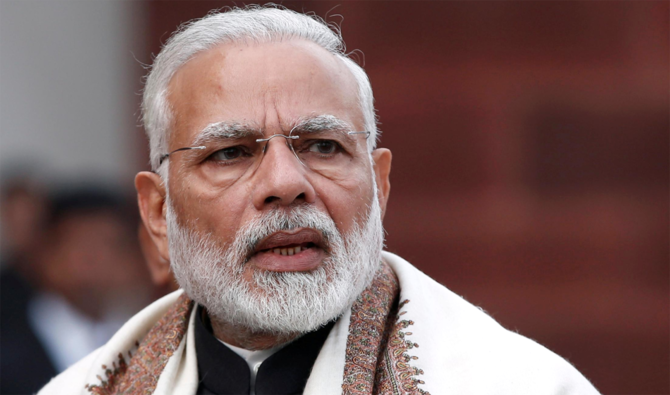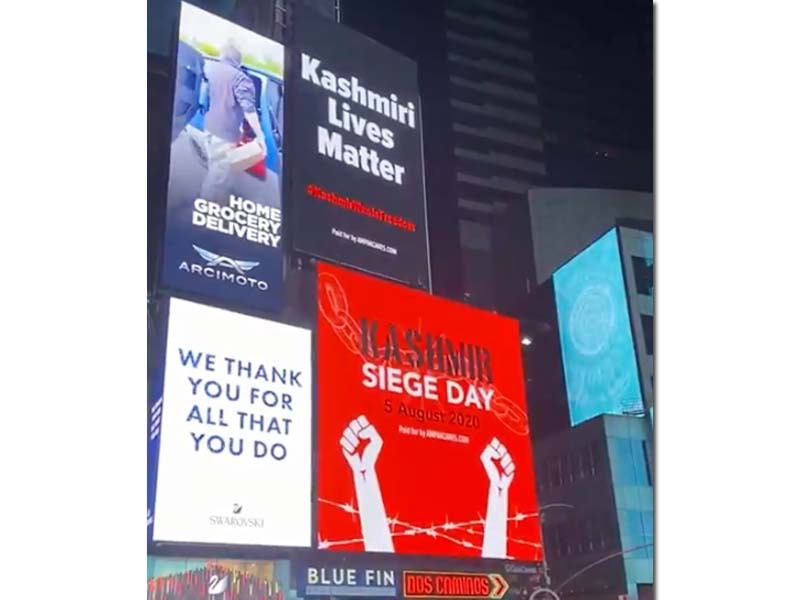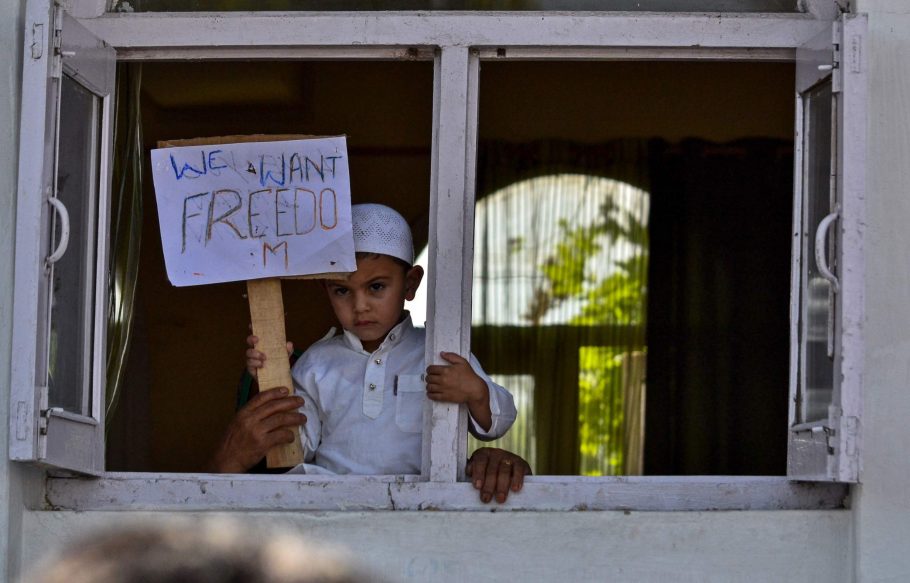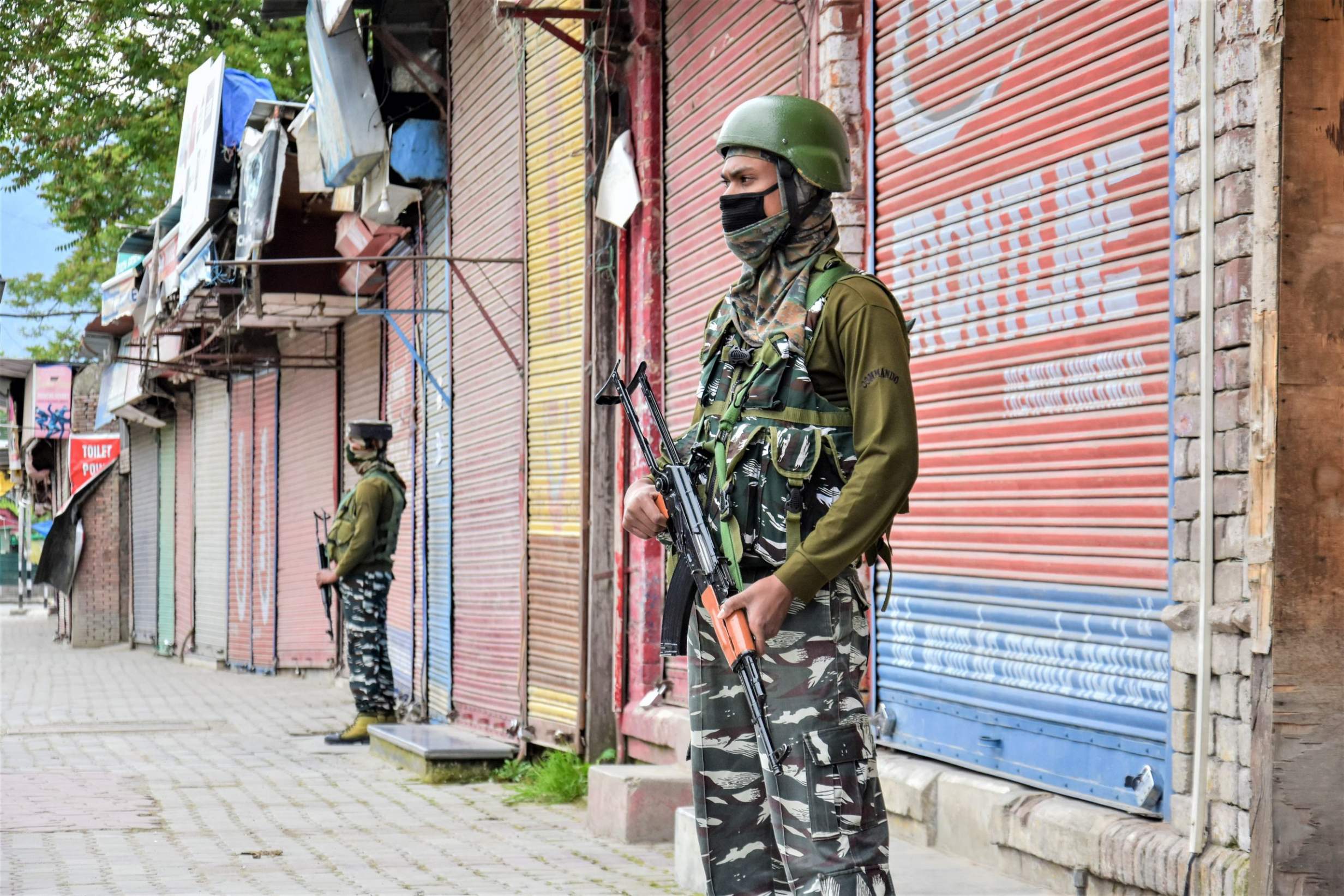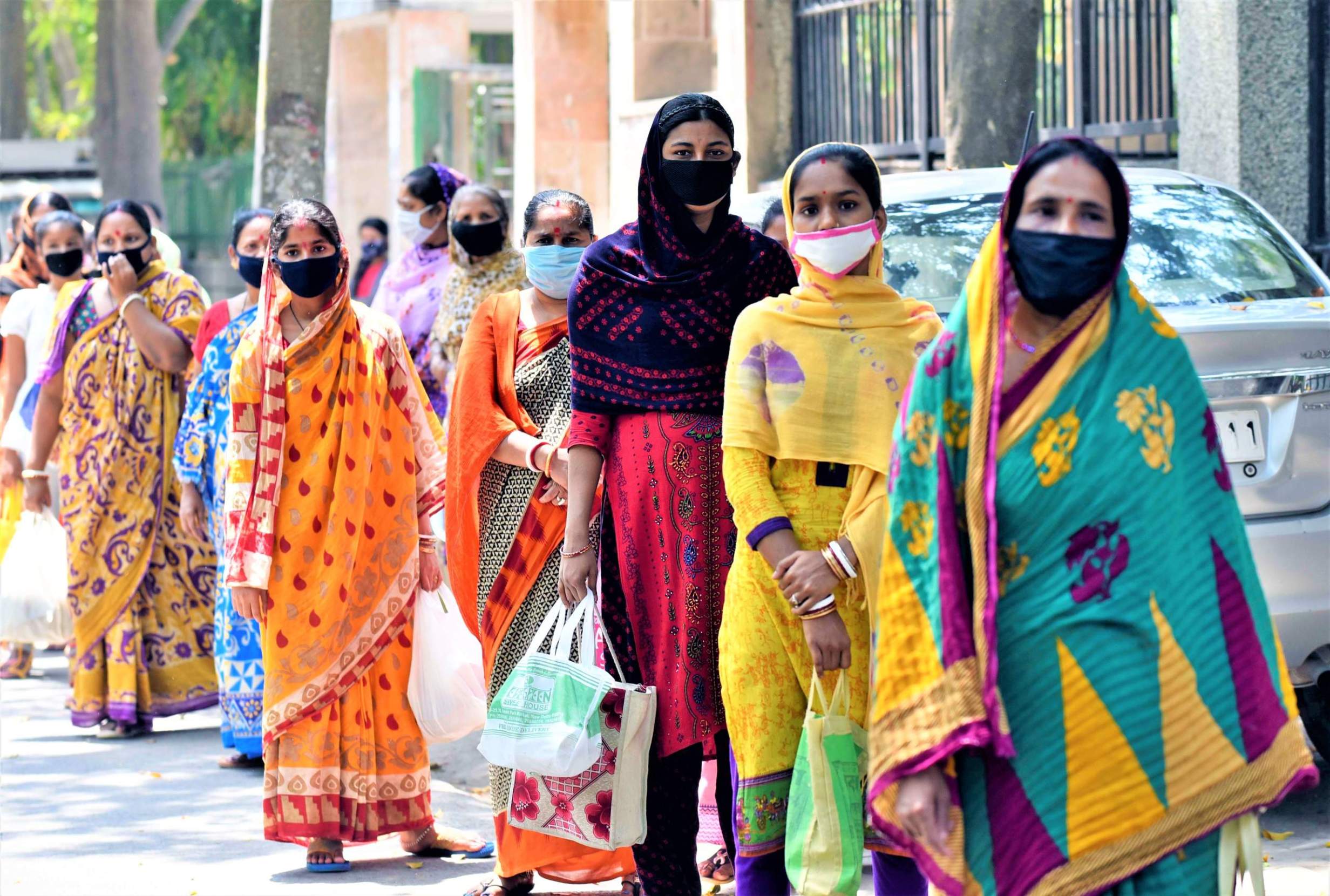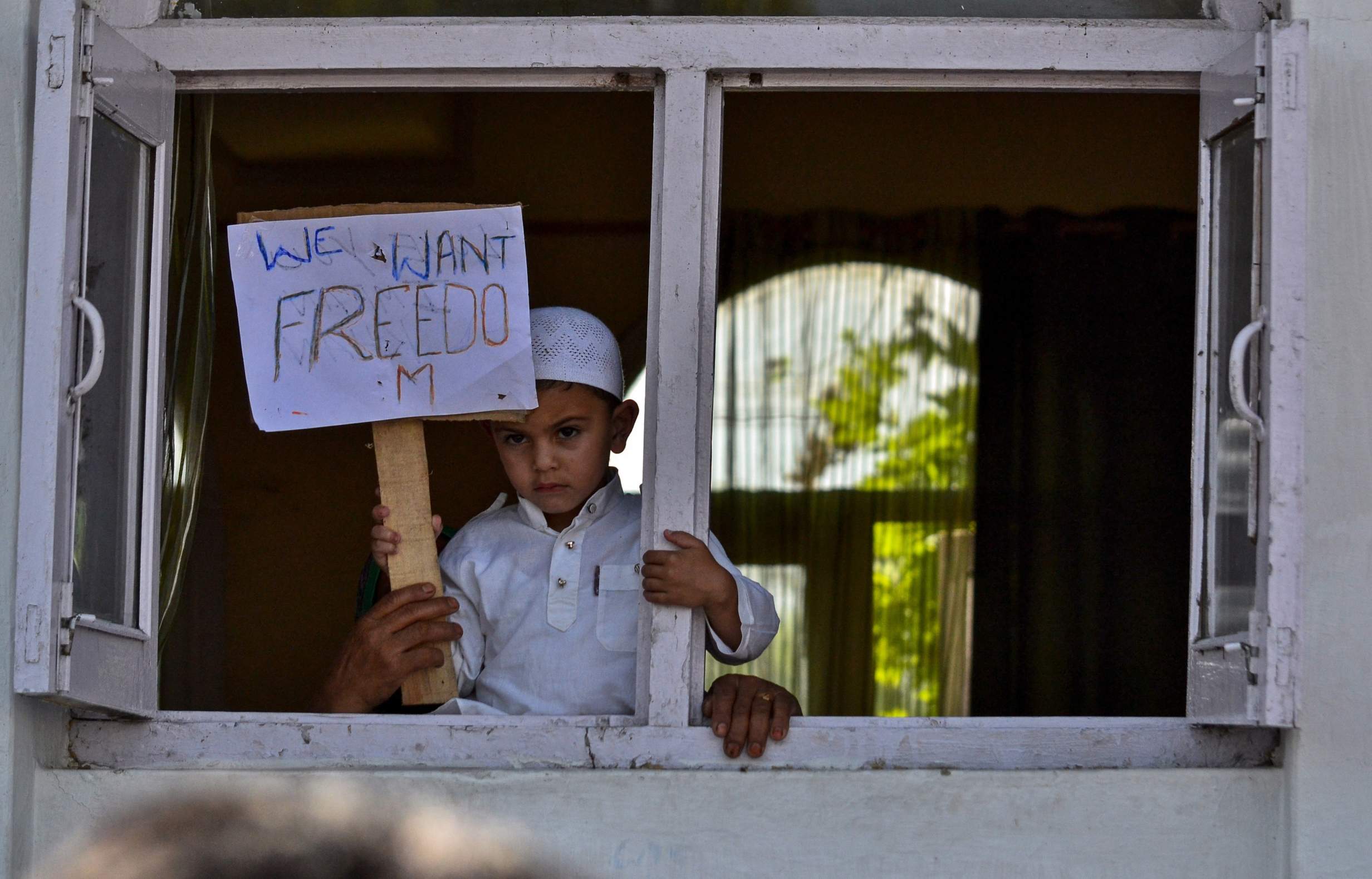Protest outside BBC, CNN headquarters for Kashmir on ‘abysmal’ coverage
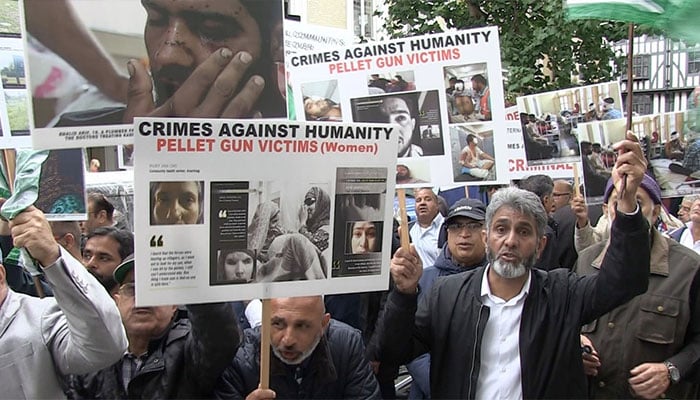
Photo by author
LONDON: Human rights activists protested outside the headquarters of BBC and CNN on Thursday to protest the apathy over the coverage of Indian occupied Kashmir as lock-down of more than eight million Kashmiris by Indian government.
The activists, mainly Kashmiri-origin British nationals, gathered outside the BBC office and demanded the publicly funded broadcaster to cover the situation in Kashmir, which has been cut off from the rest of the world for around two months now.
The protesters were carrying banners which read: “crime against humanity”, “wake up BBC”, “wake up CNN”, “stop use of pellet guns”, “India should be held accountable for crimes against humanity”, “impose economic sanctions on India”, “justice for victims of mass rape”, “freedom for Kashmir”, “wake up US, UK, UAE, OIC” and “Narendra Modi is a criminal”.
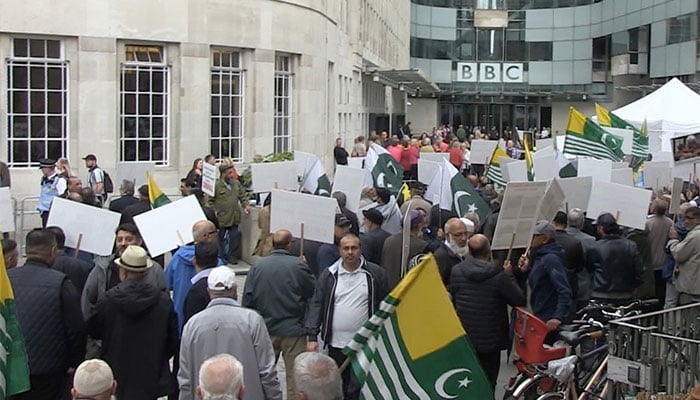
Photo: Author
The protesters called on the BBC and CNN editorial management to “wake up” and cover Kashmir impartially. Those who took part in the protest said they had gathered to show solidarity with the people of Kashmir who are suffering incalculable human rights abuses under the brutal occupation of India for the past seven decades, which has turned into a humanitarian crisis following India’s illegal actions since 5 August.
The protest organisers said in their speeches that for the past 53 days, over 8 million Kashmiris are under siege by Indian forces and have no access to internet, along with communication services being suspended.
Journalists, especially foreign, are being denied access to the Indian occupied Kashmir, which is in violation of press freedom, and universal declaration on human rights.
The protesters stated that BBC did a few good reports in the initial days after Article 370 was abrogated, but stopped providing any coverage in the days following it and there has been no coverage of any kind on BBC and CNN as the massive humanitarian crisis unfolds.
After protesting outside the BBC for an hour, the large number of protesters marched towards the CNN building a mile away where protest was held for an hour.
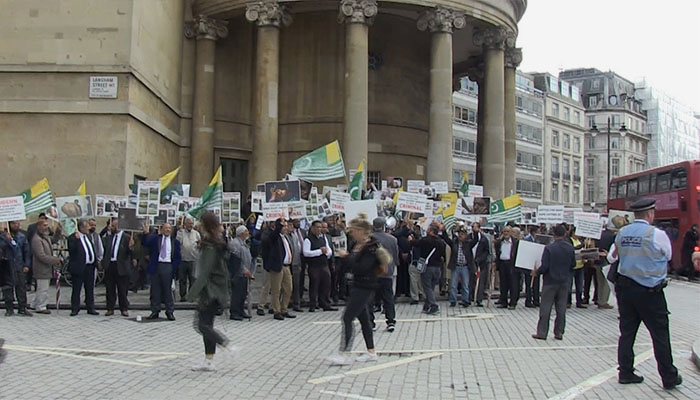
Phoot: Author
The protesters met the editorial management of both the BBC and CNN, and handed over a memorandum, requesting the broadcasters to consider giving due and impartial coverage to Kashmiris.
They said that while Kashmiris are suffering from a humanitarian crisis of such a huge magnitude, coverage by the international mainstream media is abysmal, selective and almost non-existent and the world media has turned a blind eye to one of the biggest human catastrophes.
The memorandum referred to reports by the Office of the United Nations High Commissioner for Human Rights on June 14, 2018; Human Rights Watch World Report 2019; All Party Parliamentary Group on Kashmir (APPKG) inquiry report into the human rights situation in the IOK issued on 30 October 2018.
In addition were the reports by the European Union, United States Department of State’s country report on human rights practices for 2018, Amnesty International Report of 2016-17 and the European Parliament's Ad Hoc Delegation which described Kashmir as 'the world's most beautiful prison' on earth due to unchecked, unwarranted, illegal Indian atrocities in Kashmir.
The memorandum urged the UK mainstream media to highlight the plight of Kashmiris and massive human rights abuses being committed by Indian forces with impunity.
They also urged that India should provide access to independent international media, including the UK media, an unhindered access to the occupied Kashmir.
Protest outside BBC, CNN headquarters for Kashmir on ‘abysmal’ coverage
Separately, from YOUTUBE:

Photo by author
LONDON: Human rights activists protested outside the headquarters of BBC and CNN on Thursday to protest the apathy over the coverage of Indian occupied Kashmir as lock-down of more than eight million Kashmiris by Indian government.
The activists, mainly Kashmiri-origin British nationals, gathered outside the BBC office and demanded the publicly funded broadcaster to cover the situation in Kashmir, which has been cut off from the rest of the world for around two months now.
The protesters were carrying banners which read: “crime against humanity”, “wake up BBC”, “wake up CNN”, “stop use of pellet guns”, “India should be held accountable for crimes against humanity”, “impose economic sanctions on India”, “justice for victims of mass rape”, “freedom for Kashmir”, “wake up US, UK, UAE, OIC” and “Narendra Modi is a criminal”.

Photo: Author
The protesters called on the BBC and CNN editorial management to “wake up” and cover Kashmir impartially. Those who took part in the protest said they had gathered to show solidarity with the people of Kashmir who are suffering incalculable human rights abuses under the brutal occupation of India for the past seven decades, which has turned into a humanitarian crisis following India’s illegal actions since 5 August.
The protest organisers said in their speeches that for the past 53 days, over 8 million Kashmiris are under siege by Indian forces and have no access to internet, along with communication services being suspended.
Journalists, especially foreign, are being denied access to the Indian occupied Kashmir, which is in violation of press freedom, and universal declaration on human rights.
The protesters stated that BBC did a few good reports in the initial days after Article 370 was abrogated, but stopped providing any coverage in the days following it and there has been no coverage of any kind on BBC and CNN as the massive humanitarian crisis unfolds.
After protesting outside the BBC for an hour, the large number of protesters marched towards the CNN building a mile away where protest was held for an hour.

Phoot: Author
The protesters met the editorial management of both the BBC and CNN, and handed over a memorandum, requesting the broadcasters to consider giving due and impartial coverage to Kashmiris.
They said that while Kashmiris are suffering from a humanitarian crisis of such a huge magnitude, coverage by the international mainstream media is abysmal, selective and almost non-existent and the world media has turned a blind eye to one of the biggest human catastrophes.
The memorandum referred to reports by the Office of the United Nations High Commissioner for Human Rights on June 14, 2018; Human Rights Watch World Report 2019; All Party Parliamentary Group on Kashmir (APPKG) inquiry report into the human rights situation in the IOK issued on 30 October 2018.
In addition were the reports by the European Union, United States Department of State’s country report on human rights practices for 2018, Amnesty International Report of 2016-17 and the European Parliament's Ad Hoc Delegation which described Kashmir as 'the world's most beautiful prison' on earth due to unchecked, unwarranted, illegal Indian atrocities in Kashmir.
The memorandum urged the UK mainstream media to highlight the plight of Kashmiris and massive human rights abuses being committed by Indian forces with impunity.
They also urged that India should provide access to independent international media, including the UK media, an unhindered access to the occupied Kashmir.
Protest outside BBC, CNN headquarters for Kashmir on ‘abysmal’ coverage
Separately, from YOUTUBE:

![[IMG] [IMG]](/proxy.php?image=https%3A%2F%2Fwww.washingtonpost.com%2Fresizer%2FEbMwmstxgNxmCwSFMl8JQBUlWiE%3D%2F1484x0%2Farc-anglerfish-washpost-prod-washpost.s3.amazonaws.com%2Fpublic%2FXEJ2OZHANII6TPT7JTEFAF6DN4.jpg&hash=dfce5cf48dffedeb3cb7f888262a766d)
![[IMG] [IMG]](/proxy.php?image=https%3A%2F%2Fstatic01.nyt.com%2Fimages%2F2019%2F10%2F07%2Fworld%2F06kashmir-medical-A1%2Fmerlin_160720710_3b4f9d24-ccfc-433b-a151-e107aaecd905-articleLarge.jpg%3Fquality%3D75%26auto%3Dwebp%26disable%3Dupscale&hash=8b709d1b7a5d9fc616e7bc151d882c12)
![[IMG] [IMG]](/proxy.php?image=https%3A%2F%2Fstatic01.nyt.com%2Fimages%2F2019%2F10%2F07%2Fworld%2F07kashmir-medical1%2Fmerlin_160720818_6a95937d-f15c-423c-a278-6208226de9ef-articleLarge.jpg%3Fquality%3D75%26auto%3Dwebp%26disable%3Dupscale&hash=bd431b3b3788982f08a988f59ef8f028)
![[IMG] [IMG]](/proxy.php?image=https%3A%2F%2Fstatic01.nyt.com%2Fimages%2F2019%2F09%2F30%2Fworld%2F00kashmir-medical-3%2Fmerlin_161167755_d0a1ccbf-ca45-406e-9145-00ed16eda263-articleLarge.jpg%3Fquality%3D75%26auto%3Dwebp%26disable%3Dupscale&hash=6a7041c0521e6cf10a50d8da979ca298)
![[IMG] [IMG]](/proxy.php?image=https%3A%2F%2Fstatic01.nyt.com%2Fimages%2F2019%2F09%2F30%2Fworld%2F00kashmir-medical-6%2Fmerlin_160927230_f03aca53-5c86-4cc5-a6fa-54c3b3a5d333-articleLarge.jpg%3Fquality%3D75%26auto%3Dwebp%26disable%3Dupscale&hash=973f0e85c7ef95e17d1d9c03439a337b)
![[IMG] [IMG]](/proxy.php?image=https%3A%2F%2Fstatic01.nyt.com%2Fimages%2F2019%2F09%2F30%2Fworld%2F00kashmir-medical-5%2Fmerlin_160877217_abf3222d-4ca0-4453-a292-140627b0d7cb-articleLarge.jpg%3Fquality%3D75%26auto%3Dwebp%26disable%3Dupscale&hash=4df47655305374e791a1df34ee712b25)
![[IMG] [IMG]](/proxy.php?image=https%3A%2F%2Fstatic01.nyt.com%2Fimages%2F2019%2F10%2F07%2Fworld%2F06kashmir-medical-A1%2Fmerlin_160720698_ff3499b4-0675-4490-b9ec-7cffae7985dc-articleLarge.jpg%3Fquality%3D75%26auto%3Dwebp%26disable%3Dupscale&hash=ed45912fd2981a0a446af1fa4b093155)
